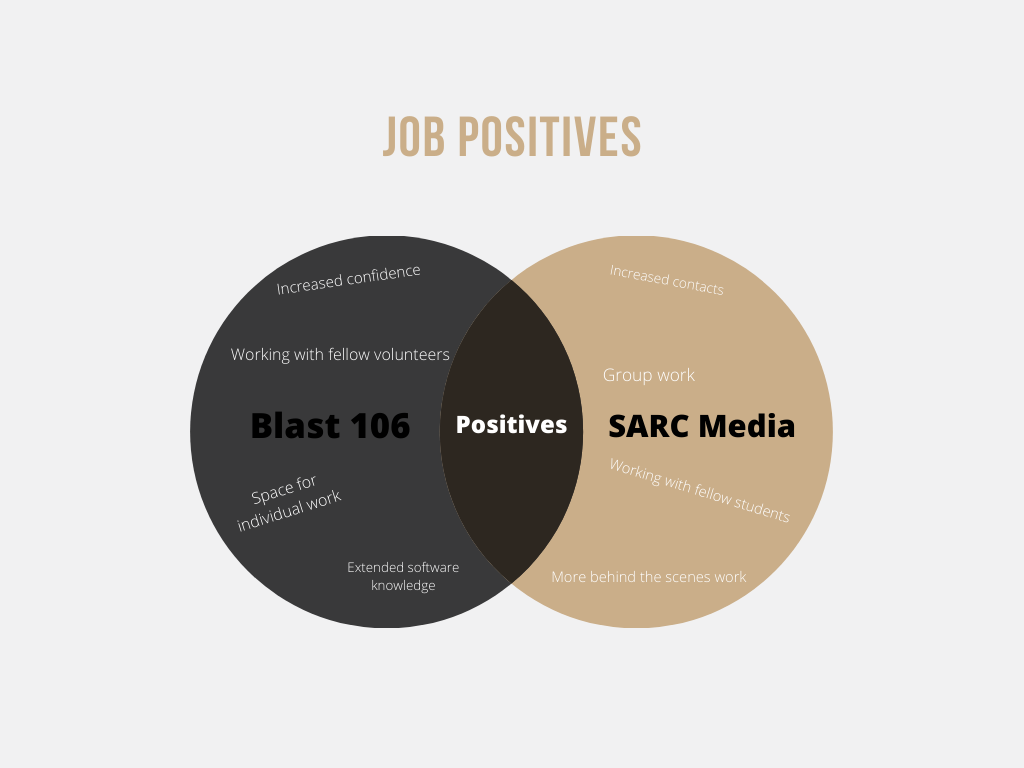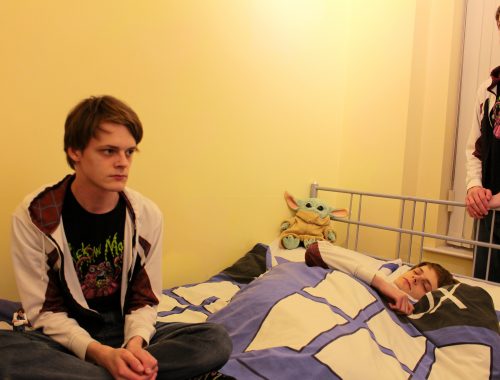AEL 3001 Blog Post 1
Prior to my placement, my interest in radio and radio production had grown greatly during my second year (particularly through the “Radio and Podcast” module) and the three months I have spent with both Blast 106/IUR FM and the SARC Media Team have allowed me to enhance and reflect on that engagement. Thompson et al. have discussed how “learning will not take place and practice will not develop if no connections are made between the thinking and the doing.” (10) So in conjunction with this, I will be using Gibbs’ model of reflection to contemplate my practices completed so far with Blast 106/IUR FM as well as the SARC Media Team.

Through reflecting on our practice, we become more aware, more in control, more able to see our strengths and our development needs. (Tarrant 2)
I was eager to engage with two placements as I felt I would be given more room to explore different areas of the industry – but I actually have received the opportunity to gain more radio experience across the board. There is certainly pressure with radio, but it is something I always wanted to try my hand at in a professional capacity. I do not consider myself to be a presenter-type of person – but I have found that my work with both BLAST 106 and SARC has led to greater growth in perseverance, thinking on my feet as well as expanding my knowledge regarding other forms of audio software and recording.
After some initial struggles to get in contact with several organisations, I contacted the IUR FM team in late August, having understood their position as a volunteer-based broadcast organisation – as well as being very much local to me. I got a response back almost instantly, much to my delight. After contacting the head of content and compliance, I was invited to come in and do the breakfast show with Neil, in the Blast studio at 7am. This involved getting up at 5am in order to be at the studio for 7, and I will most likely be doing this show most often – but I did find this early start quite difficult on the initial go. Yet the experience was enjoyable overall, and my trial ‘voice test’, conducted to see if I had a voice suitable for presenting, meant that I was able to speak on-air for a few moments. Initially rather a daunting task,after a minute or two I felt at ease conversing with Neil. This initial day (and my work with them in total) did not only involve the technical side of things, but taught me a lot about what it means to be involved in the community aspect of radio.
I was sent through a list of training materials to prep me through getting a start in radio – some things I didn’t consider! Such as the creation of the individualised experience – how radio is all about speaking to one person. Guy Starkey has noticed the importance of this familiarity between presenter and listener, stating that “the intimacy of radio encourages the development of a bond between the listener and the presenter”- this idea of “the friend ‘dropping in’” (59) With this sort of intimacy at the forefront also comes a relatively large amount of freedom and space to work with behind the scenes: I have been given tasks to do where I can do it in my own time. Being given a deadline and working singularly on behalf of a team has been exciting, and whilst sticking to these can be tough, especially in the midst of other obligations, it is something I could see myself doing in the future.

Another process I’ve been enjoying has been creating imaging for the stations – creating elements such as “Priceless Decades with Billy Mac, this is IUR FM’. I found this quite hard at first because I was using Adobe Audition which I’d never used before – and even after using it for a while I’m still not quite so used to it. In my initial attempt in the Blast office the programme kept freezing, and thankfully I wasn’t under any time pressure – but if I was and this situation arose again, I would simply force quit the programme and load it up again, rather than endure unreliable and consistent freezing. Bolton examines how reflective practice on less than ideal circumstances “can take us out of our own narrow range of experience and help us to perceive experiences from a range of viewpoints and potential scenarios.” (10) So in hindsight, I was actually rather thankful that this occurred, as it gave me the opportunity to preempt what I would do under such time pressure.
Whilst Blast and IUR FM are mostly singular work, perhaps working with a co-host at best, the Radio Team is more concerned with engaging a team of people, as well as contacting and discussing with others about getting their work involved. Whilst we are currently at the stages of creating items to help put the show together, there is more need for scheduling and organising rather than the production side of things, so I am achieving this balance of pre-production and production across the board.
However, I feel like it would’ve benefitted me to have worked with the Radio team last year or the year before to get a grip of the workings: as I’m trying to balance the workings of two radio stations, and both of them new, it would have been effective to have some familiarity with the Media Team.
In a final reflection, Bassot examines how “in a relatively short space of time it is easy to ‘get stuck in a rut’, doing things a particular way because you have always done them that way.” (2) So by branching out into more professional environments, I can focus on my strengths as well as pinpoint my weaknesses far, has brought out an interest in me that I may not have necessarily explored professionally otherwise.
Works Cited
Bassot, Barbara. “What Is Reflective Practice?” The Reflective Practice Guide: An Interdisciplinary Approach to Critical Reflection, Taylor & Francis, 2015, pp. 1–15.
Bolton, Gillie. “Reflective Practice: An Introduction.” Reflective Practice: Writing and Professional Development, SAGE Publications, 2010, pp. 3–25.
Gibbs, Graham. Learning by Doing: A Guide to Teaching and Learning Methods. FEU, 1988.
Starkey, Guy. “Live Sequences and Phone-Ins.” Radio in Context, Bloomsbury Publishing Plc, 2013, pp. 58–89.
Tarrant, Peter. “What is Reflective Practice?” Reflective Practice and Professional Development, SAGE Publications, 2013, pp. 1-18
Thompson, Sue, and Neil Thompson. “What Is Reflective Practice?” The Critically Reflective Practitioner, Palgrave Macmillan, 2008, pp. 7–32.
Making it Happen
You May Also Like

Facing Avoidance
26 November 2021
Feast vs Famine
26 November 2021
